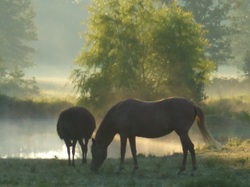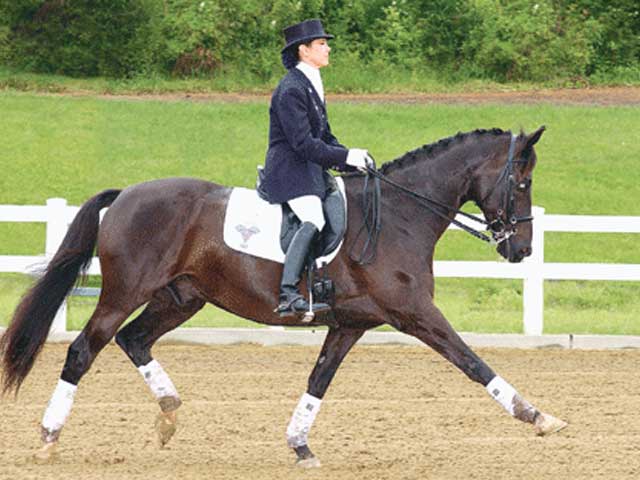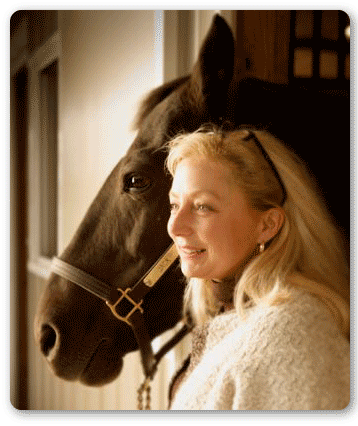Is Your Horse Showing Signs of Equine Blindness?

The relationship between a horse and its owner can be uncanny. Through consistency and trust, that bond can actually grow through a disability such as equine blindness. If you are thinking your horse may have some vision problems, please read on. This article may help you to understand why your horse’s behavior is changing...
Equine blindness can have many degrees of impairment and can evolve from an illness or impairment that develops over time. Vision changes can be slight or can developed into only seeing shadows or progress to total blindness. Signs of falling vision in horses can be, (and not limited to), bumping into walls or fences, signs of not wanting to move forward, or anxious or skittish behavior. These signs can be further noticed in lower-light areas or when there is less daylight. Some horse owners say that they notice their horse tends to tilt his or her head and rather than walking out, they circle in pasture.
Early diagnosis is the best advise when it comes to our horse’s health. Consulting your veterinarian at any signs of change may even help to prevent further health issues.
Many people owning blind horses have noted that they were not remotely persuaded to think about euthanasia. Rather, the horse owner worked through the process of changes, with their horse, that were needed to make life almost normal again! A vet once told me that animals handle health issues much different than humans. He said that animals look at injury as an 'incontinence' and soon adapt - the best that they can - to the new situation. And that seems to be the case with many horses.
Consistency and Trust
As different as humans are, horses have diverse personalities too. The adaptation of blindness with horses depends highly on the horse and its temperament. Definitely their needs to be a commitment for care and provisions for safer living areas without the threat from other heard horses higher in the pecking order. It can take anywhere from a few weeks to a few months for horses to keenly adjust their focus on their senses of smell and hearing to find their way around. Additionally, handlers need to instill trust through using their voices consistently to encourage a strong bond. In some cases, blindness is in only one eye of the horse. Since a horses eye set is from side to side (rather than from the front, like humans), there is a blind spot directly in front of the horses face. Talking lets the horse know where you are standing...similar to when a horse wears blinders - they listen for your voice and respond to touch.
So what are some of the things that you can do to help your horse gain trust and be less anxious?
Start with your voice - Consistent talking will help greatly. This lets your horse sense where you are and teaches him to 'listen' more intently. By speaking and then using 'command' words, you will be giving your horse a 'picture' of what is going to happen. You voice will also allow your horse to know what and where you will be touching him with words like ' hoof or hoof pick, halter, blanket, saddle, etc'. You will gain trust and help to stop the element of surprise through your voice. As time goes on you can add obstacles so that your horse will anticipate them. On the other end of the spectrum, your voice will also help to keep your horse from walking 'into' you once the trust has been established.
Let people know that your horse is blind or going blind - Post signs. Anyone at your farm would be better able to understand your horse’s situation with a sign to let him or her know you have a blind horse. If you can, be present if someone new is around your horse so you can explain how he/she is handled. This will instill trust and also avoid an accidental injury. In-between blindness can create moodiness or anxiety, while completely blind horses can be more trusting. In either case, awareness of a lack of vision will enable you to offer a good experience and consistency for your horse.
Don't clip whiskers - Whiskers are great 'feelers' for horses and let your horse find things easier. Even eye 'whiskers' will help to avoid bumps.
Make feeding times less stressful- Feeding times can be stressful if your horse is in a heard. Consider feeding your horse in an area that allows him to feel secure with out worry. A blind horse quickly goes to the bottom of the pecking order and needs to be able to eat and graze with out a threat of getting kicked or pushed away from the food source. Feed buckets, managers, grain bowls can be marked with secure bells allowing your horse to 'hear' where the food is located. Consistency will help your horse to feel more secure.
Consider 'noise' to help your horse know where its walkways are located - Your horse will focus in on its hearing more than before. You can use noise to help your horse know where it will be walking. Low playing radios, gentle sounding wind chimes and non-alarming noises can indicate, to your horse, where he is isolated and walking.
Prepare your pasture - There is no better way to help your horse than to provide a safer pasture with impaired vision. Remove any bare wire or barbed wire and avoid electric when ever possible. Replace with Ramm Flexible fencing that flexes up to 6 inches. A forgiving fence will be your horse’s best bet in helping to avoid injury. Provide closer rail spacing by using a 4 rail wide (5") fence to help with any change of 'walking through' or confusion. It is the kindest rail, over wood, wire or pipe and will provide 'gentle' containment. Consider using wood chips in walk areas or around the perimeter of your pastures so your horse can tell when he is 'off track'. This will also allow your horse to go into other paddocks as needed with out as much confusion. Owners have said that their blind horse can learn to run and play in pasture as well as halt before running into fence lines. Once again, consistency will greatly help. Check for any holes in your pastures and fill them.
Companion or guide horses - Many people have found just the right companion for a blind horse allowing them to form an incredible bond. One owner started that 'its magic' and that its an 'unbreakable bond that's wonderful'. Guide horses or even companion animals most often wear a bell on a halter or have it 'tied' in the mane so the horses can walk together!

(Valiant, 8 year old Warm blood that lost vision as a 6 yr old)
Owning a blind horse can be extremely fulfilling and does not have to be the end of your riding or even showing career. One very successful horse, Valiant, a Dutch Warm blood gelding can be seen on YouTube, (Valiant (8 year-old Dutch Warm blood gelding) performing a dressage test in Florida. Blind since the age of 6, Valliant has been trained for upper level dressage, since he lost his sight. This horse is beautiful, extremely useful with a definite purpose in life.
Think again if you have fallen in love with a horse that has this disability and people have advised you with caution! Your relationship with your horse is what matters! Through trust and compassion your best life adventure can be with any horse, but maybe - especially with one that is blind!
 Debbie has over 45 years experience with horses and equine-related businesses. She has owned, trained, boarded horses and run stables at various times in her career. She is a certified fence installer, has given balanced riding lessons, and has shown horses in Western, Western Pleasure, Trail, English, Hunter/Jumper, Fox Hunting, Hunter Trials, Dressage and driving classes. Debbie has been involved in foaling, and just about every aspect of horse ownership possible, and she welcomes your questions and comments. If you are interested in using any articles by Debbie, please send her an email.
Debbie has over 45 years experience with horses and equine-related businesses. She has owned, trained, boarded horses and run stables at various times in her career. She is a certified fence installer, has given balanced riding lessons, and has shown horses in Western, Western Pleasure, Trail, English, Hunter/Jumper, Fox Hunting, Hunter Trials, Dressage and driving classes. Debbie has been involved in foaling, and just about every aspect of horse ownership possible, and she welcomes your questions and comments. If you are interested in using any articles by Debbie, please send her an email.
RAMM Fence Systems, Inc. makes every effort to provide reliable and useful information on horse health, care and products. The statements made on this website are based on years of experience with horses, however, they are based on generalized situations and should not replace diagnosis or treatment by a veterinarian or consultation by a professional. RAMM Fence Systems, Inc. does not assume any legal responsibility. Readers should always consult qualified health care providers for specific diagnosis and treatment.
(Valiant Image courtesy of http://www.equisearch.com)
